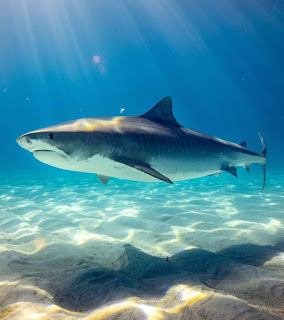Showing posts with label Shark. Show all posts
Showing posts with label Shark. Show all posts
Saturday, June 13, 2020
How do Sharks identify their prey?
Sharks have electro reception, which is a keen sensitivity to electrical impulses. As fish swim around, their movement sends tiny electrical signals through the water. Sharks pick up on those signals as the water passes over a series of jelly-filled pores, which are sensory organs on their head. This electro reception allows sharks to snag prey with deadly accuracy, even in murky water.
Can Sharks swim backwards?
A shark’s pectoral fins cannot bend upwards like a fish, limiting its swimming ability to forward motion. Unlike fish, sharks cannot stop suddenly or swim backwards. They cannot simply stop and must keep swimming or it will sink. This is because they must force sea water through their open mouths and over their gills to breathe.
Why do Sharks bite humans and leave them?
Why do Sharks bite humans and leave them?
Most sharks like to test their prey before entirely devouring them and that’s why most attacks on humans are just a bite or two. They are known to perform test biting with many familiar and unfamiliar objects in order to determine what kind of object it might be. Humans in any case are not appropriate prey for them as the sharks digestion is too slow to cope with the humans body high ratio of bone to muscle and fat. Even if they attack humans by mistake, a death occurs by loss of blood from the initial limb injury rather than from devouring.
Subscribe to:
Comments (Atom)
How do Sharks identify their prey?
Sharks have electro reception, which is a keen sensitivity to electrical impulses. As fish swim around, their movement sends tiny electrical...

-
Bulls have no reaction towards any colour as they are actually colour blind. The red colour of the cape used during a bull fight is a matter...
-
Why are Jackals noisy? Jackals are noisy because they communicate with each other by a screaming yell and yapping or a siren like howl when ...
-
A shark’s pectoral fins cannot bend upwards like a fish, limiting its swimming ability to forward motion. Unlike fish, sharks cannot stop su...




